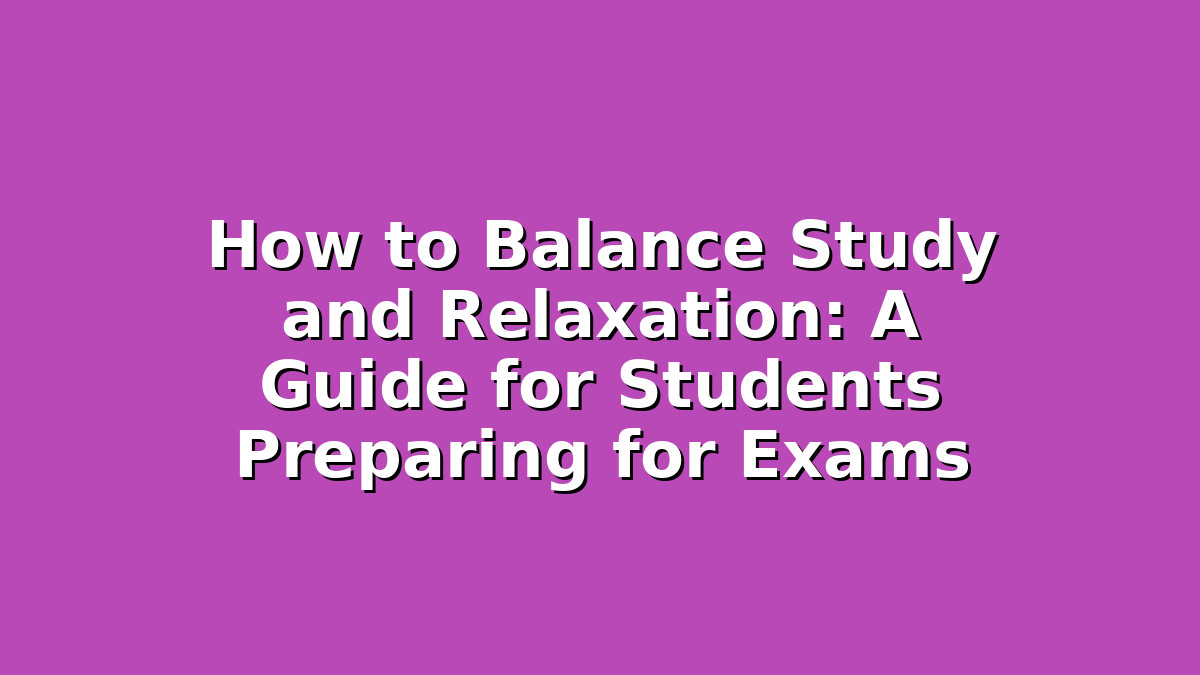Preparing for exams can be a stressful and demanding time for students. Balancing the need to study effectively with the equally important need to relax and recharge is essential for success and well-being. If you find yourself overwhelmed by endless study sessions or guilty about taking breaks, this guide is here to help. Learning to strike the right balance between focused study and meaningful relaxation can boost your productivity, improve retention, and protect your mental health. In this article, we’ll explore practical strategies tailored for students preparing for exams or looking to improve their study habits.
1. Create a Structured Study Schedule with Built-in Breaks
One of the most effective ways to balance study and relaxation is by designing a well-structured study schedule. Without a plan, students often either cram all night or procrastinate, both of which undermine learning and increase stress.
Why Structure Matters:
A study schedule helps you allocate your time wisely and ensures you cover all topics before your exams. Including regular breaks within your schedule helps maintain focus and prevents burnout.
How to Build Your Schedule:
– Set Specific Goals: Break down your subjects into manageable chunks. For example, instead of “study biology,” plan to “review chapters 3 and 4 and complete practice questions.”
– Use Time Blocks: Study in focused intervals, such as 25-50 minutes, followed by 5-10 minute breaks. This method, known as the Pomodoro Technique, is scientifically proven to enhance concentration.
– Schedule Relaxation Time: Don’t just schedule study periods—schedule your relaxation too. Plan times to exercise, socialize, or engage in hobbies. Treat these as appointments you cannot miss.
– Prioritize Difficult Subjects First: Tackle the hardest subjects when your mind is freshest, often earlier in the day, and leave lighter topics or revision for later.
Benefits:
This approach helps you avoid fatigue, improves learning efficiency, and gives you permission to relax during breaks without guilt. You’ll find that well-timed rest actually enhances your ability to absorb information.
2. Use Relaxation Techniques to Recharge Your Brain
Relaxing isn’t just about stopping work — it’s about actively recharging your brain and body so you can return to studying refreshed and ready to absorb new information. Many students underestimate the power of relaxation techniques and simply “zone out” on their phones or social media, which can sometimes increase stress.
Effective Relaxation Methods for Students:
– Deep Breathing Exercises: Taking slow, deep breaths for a few minutes can lower stress hormones and calm your nervous system. Try inhaling for 4 seconds, holding for 7 seconds, then exhaling for 8 seconds. Repeat several times.
– Mindfulness Meditation: Spending 5-10 minutes focusing on your breath or a simple guided meditation app can clear your mind and improve focus.
– Physical Activity: Even a short walk, stretching, or a quick workout session can boost endorphins and reduce anxiety. Exercise is one of the healthiest ways to relax.
– Progressive Muscle Relaxation: This technique involves tensing and then relaxing different muscle groups to release physical tension. It’s especially useful if you feel physically stressed or restless during study periods.
Why These Matter:
When you actively relax, you reduce cortisol levels (the stress hormone) and promote mental clarity. This makes it easier to focus when you return to studying and helps prevent burnout over the course of your exam preparation.
3. Cultivate Healthy Lifestyle Habits for Sustainable Balance
Balancing study and relaxation isn’t just about what you do while you’re sitting at your desk or on your couch—it’s about the lifestyle habits that support sustained energy and mental wellness.
Sleep:
Never underestimate the power of sleep for your brain. Aim for 7-9 hours each night to consolidate memories and process what you’ve learned during the day. Avoid all-nighters; they impair cognitive function and decrease your ability to retain information.
Nutrition:
Fuel your brain with balanced meals rich in whole grains, lean proteins, fruits, and vegetables. Stay hydrated and limit excessive caffeine, which can increase anxiety and disrupt sleep.
Social Connections:
Spending time with friends and family can act as a powerful mental reset. Social support reduces stress and helps maintain motivation.
Set Boundaries with Technology:
It’s easy to get distracted by phones, social media, or gaming. Set limits on usage during study time and include tech-free relaxation periods. Use apps or settings to block distracting notifications as needed.
Create a Comfortable Study Environment:
A clean, organized, and well-lit space reduces distractions and stress. Comfortable seating and minimal noise help you focus, while having a separate relaxation spot encourages your brain to switch modes when study time ends.
Why These Lifestyle Factors Are Important:
When your body feels good and your mind is rested, your study sessions become far more productive. Healthy habits reduce the physical and emotional toll of exam preparations and help you maintain a positive mindset.
—
Conclusion
Balancing study and relaxation during exam preparation is not only possible—it’s essential. By creating a structured study schedule with breaks, using effective relaxation techniques, and cultivating healthy lifestyle habits, you set yourself up for success both academically and emotionally. Remember, quality beats quantity when it comes to study time, and your brain needs rest to perform at its best.
Be kind to yourself throughout this process. Taking care of your well-being is a crucial part of doing well in exams. With practice, patience, and the right strategies, you’ll find a balance that feels sustainable and empowering. So, start planning your study and relaxation times today—you deserve it.
Good luck with your exams!

Responses